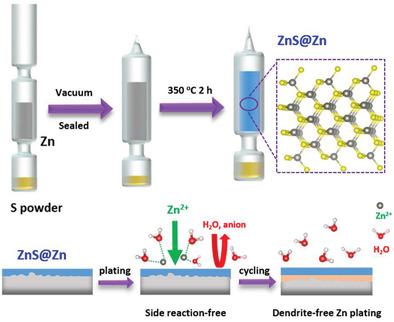当前位置:
X-MOL 学术
›
Adv. Mater.
›
论文详情
Our official English website, www.x-mol.net, welcomes your feedback! (Note: you will need to create a separate account there.)
An In-Depth Study of Zn Metal Surface Chemistry for Advanced Aqueous Zn-Ion Batteries.
Advanced Materials ( IF 29.4 ) Pub Date : 2020-07-08 , DOI: 10.1002/adma.202003021 Junnan Hao 1, 2 , Bo Li 3 , Xiaolong Li 1 , Xiaohui Zeng 1 , Shilin Zhang 1 , Fuhua Yang 1 , Sailin Liu 1 , Dan Li 4 , Chao Wu 1 , Zaiping Guo 1, 2
Advanced Materials ( IF 29.4 ) Pub Date : 2020-07-08 , DOI: 10.1002/adma.202003021 Junnan Hao 1, 2 , Bo Li 3 , Xiaolong Li 1 , Xiaohui Zeng 1 , Shilin Zhang 1 , Fuhua Yang 1 , Sailin Liu 1 , Dan Li 4 , Chao Wu 1 , Zaiping Guo 1, 2
Affiliation

|
Although Zn metal has been regarded as the most promising anode for aqueous batteries, it persistently suffers from serious side reactions and dendrite growth in mild electrolyte. Spontaneous Zn corrosion and hydrogen evolution damage the shelf life and calendar life of Zn‐based batteries, severely affecting their industrial applications. Herein, a robust and homogeneous ZnS interphase is built in situ on the Zn surface by a vapor–solid strategy to enhance Zn reversibility. The thickness of the ZnS film is controlled via the treatment temperature, and the performance of the protected Zn electrode is optimized. The dense ZnS artificial layer obtained at 350 °C not only suppresses Zn corrosion by forming a physical barrier on the Zn surface, but also inhibits dendrite growth via guiding the Zn plating/stripping underneath the artificial layer. Accordingly, a side reaction‐free and dendrite‐free Zn electrode is developed, the effectiveness of which is also convincing in a MnO2/ZnS@Zn full‐cell with 87.6% capacity retention after 2500 cycles.
中文翻译:

先进的水性锌离子电池锌金属表面化学的深入研究。
尽管锌金属一直被认为是水性电池最有希望的阳极,但它始终遭受严重的副反应和在温和电解液中枝晶的生长。锌的自发腐蚀和析氢会破坏锌基电池的保质期和日历寿命,从而严重影响其工业应用。在本文中,通过汽固策略在Zn表面上建立了坚固且均匀的ZnS相,以增强Zn可逆性。通过处理温度控制ZnS膜的厚度,并优化被保护的Zn电极的性能。在350°C下获得的致密ZnS人造层不仅通过在Zn表面上形成物理屏障来抑制Zn腐蚀,而且还通过在人造层下引导Zn镀层/剥离来抑制枝晶生长。2 / ZnS @ Zn满电池,经过2500次循环后,容量保持率为87.6%。
更新日期:2020-08-26
中文翻译:

先进的水性锌离子电池锌金属表面化学的深入研究。
尽管锌金属一直被认为是水性电池最有希望的阳极,但它始终遭受严重的副反应和在温和电解液中枝晶的生长。锌的自发腐蚀和析氢会破坏锌基电池的保质期和日历寿命,从而严重影响其工业应用。在本文中,通过汽固策略在Zn表面上建立了坚固且均匀的ZnS相,以增强Zn可逆性。通过处理温度控制ZnS膜的厚度,并优化被保护的Zn电极的性能。在350°C下获得的致密ZnS人造层不仅通过在Zn表面上形成物理屏障来抑制Zn腐蚀,而且还通过在人造层下引导Zn镀层/剥离来抑制枝晶生长。2 / ZnS @ Zn满电池,经过2500次循环后,容量保持率为87.6%。



























 京公网安备 11010802027423号
京公网安备 11010802027423号